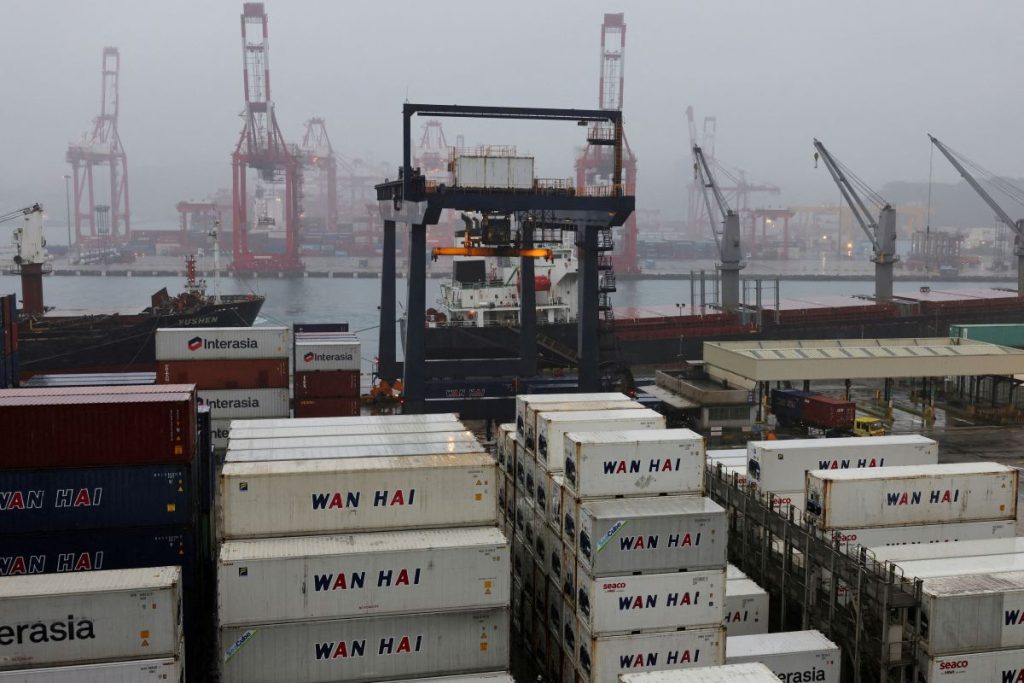 Credit: Reuters
Credit: Reuters WASHINGTON/TAIPEI (Reuters) -U.S. President Donald Trump’s administration is negotiating a deal that could commit Taiwan to fresh investment and training of U.S. workers in semiconductor manufacturing and other advanced industries, according to five people familiar with the matter.
Under the arrangement, Taiwanese companies including TSMC, the world’s largest contract chipmaker, would send new capital and workers to expand their U.S. operations and train U.S. workers.
Taiwan’s exports to the United States are currently subject to a 20% tariff, and Taipei has been in talks to reduce that figure as part of an overarching deal with Washington. Semiconductors, vital for all kinds of high-tech products, are currently exempt from tariffs while the U.S builds domestic capacity.
One of the people said the total U.S. investment to be pledged by Taiwan would be smaller than that of its main regional economic rivals, and would include support to help Washington build science park infrastructure drawing on Taiwanese know-how. The person and others spoke on condition of anonymity because of the sensitivity of the matter.
South Korea and Japan have pledged a total of $350 billion and $550 billion in investment in the U.S., respectively, under deals to trim U.S. tariffs on most of their goods to 15% from 25%.
It was unclear when the Taiwan deal would close or what specifics would make it into the final agreement, according to the people. They cautioned that any deal terms could change until they were finalized in negotiations. The workforce training aspect of the deal has not previously been reported.
“Until announced by President Trump, reporting about potential trade deals is speculation,” said White House spokesman Kush Desai. The U.S. trade representative’s office did not respond to a request for comment.
Trump has previously said some skilled foreign workers may be necessary to train Americans in state-of-the-art factories.
TAIWAN LOOKS TO REPLICATE ITS MODEL
TSMC, which declined to comment on the trade talks, has struggled to find the right workers for its U.S. projects.
CEO and Chairman C.C. Wei said in January building the new factory in Arizona has taken at least twice as long as in Taiwan, citing a shortage of skilled workers and gaps in the supply chain. TSMC, for example, brought half of the construction workers from Texas to Arizona, increasing costs due to relocation and accommodation, he said.
Taiwan’s Office of Trade Negotiations said in a statement that its team was continuing to discuss supply chain cooperation with the United States under a “Taiwan model.”
Taiwan began developing its science parks, where the bulk of its semiconductor manufacturing takes place, in the 1980s, building up a whole supply chain for seamless production.
Speaking to reporters in Taipei on Wednesday, Taiwan Premier Cho Jung-tai said the two sides are at the stage of exchanging documents to firm up certain details.
“It is very difficult for other countries to do this kind of work, because only we have this concept, practice, and track record of service parks, which allows us to undertake this kind of initiative in the United States,” he added.
Last month, Taiwan Vice Premier Cheng Li-chiun, who is leading talks aimed at reducing Trump’s tariffs on Taiwanese exports, said she was hopeful both sides could reach a consensus on expanding investment in the United States.
While Taipei has been keen to show its commitment to Trump’s call to boost U.S. manufacturing, it has also said the most advanced semiconductor technologies and research will remain on Taiwan.
Last week, Trump acknowledged criticism of programs that welcome skilled foreign workers but said doing so was necessary to dominate in key industries. In a speech at a U.S.-Saudi investment forum, Trump referenced opening up “a big plant with your friend from Taiwan, where we’re going to have 40 or 50% of the computer chip business.”
He added: “Our people have to be taught. This is something they’ve never done, and we’re not going to be successful if we don’t allow people that invest billions of dollars in plant and equipment to bring a lot of their people from their country to get that plant open, operating and working.”
Young Liu, chairman of Taiwan’s Foxconn, Nvidia’s largest server maker, said last week the company was looking to work with the U.S. and other countries to build science parks, adding that he hoped this could help trade negotiations.
RISING TRUMP TARIFFS PROMPTED TALKS
Taiwan’s representative to the APEC summit, Lin Hsin-i, said this month that he and U.S. Treasury Secretary Scott Bessent had discussed supply chains and semiconductors during a meeting on the sidelines of the event in South Korea.
Lin said Bessent had been keen to hear about Taiwan’s experience in building up its semiconductor clusters.
Trump said in August the U.S. would impose a tariff of about 100% on imports of semiconductors but exempted companies that are manufacturing in the U.S. or have committed to do so, which includes TSMC, though U.S. officials are privately saying that they might not levy them soon, Reuters reported this month.
TSMC, whose business is surging on strong demand for artificial intelligence applications, is investing $165 billion to build chip factories in Arizona, though the bulk of its production will remain in Taiwan.
Other Taiwanese companies have announced new plans for investment in the United States, including silicon wafer manufacturer GlobalWafers.
Any agreement with Taiwan could rile Beijing. Chinese President Xi Jinping told Trump in a call on Monday that Taiwan’s “return to China” was an important matter for the country. The White House has not commented on that element of the call.
The United States is Chinese-claimed Taiwan’s most important international backer and the ultimate guarantor of its security, despite the lack of formal diplomatic ties.
Inside Telecom provides you with an extensive list of content covering all aspects of the Tech industry. Keep an eye on our News section to stay informed and updated with our daily articles.